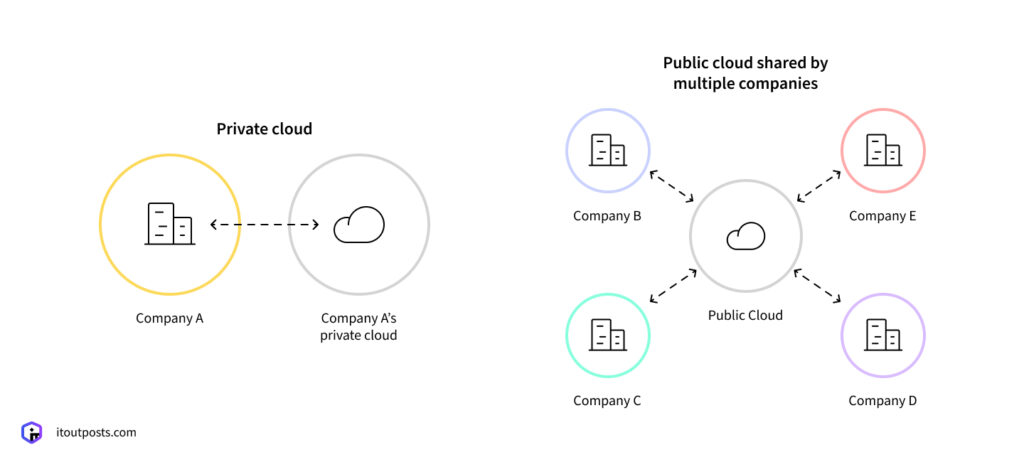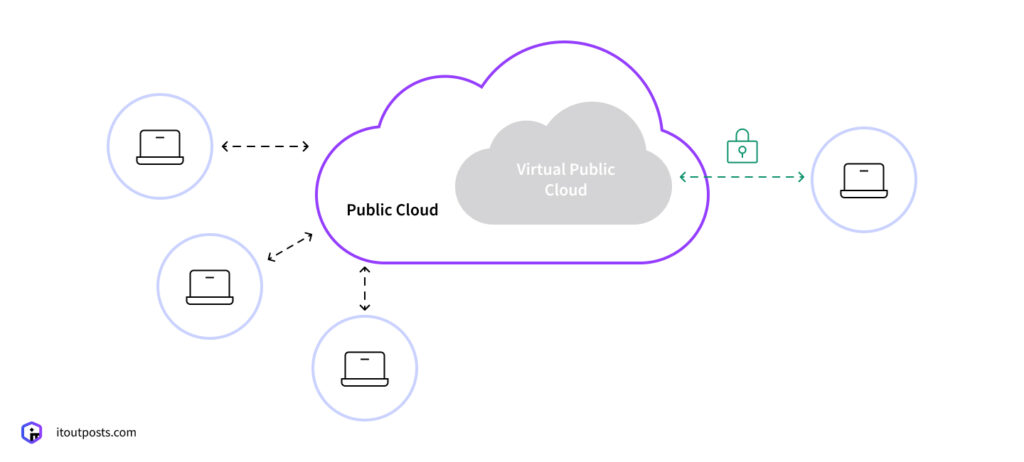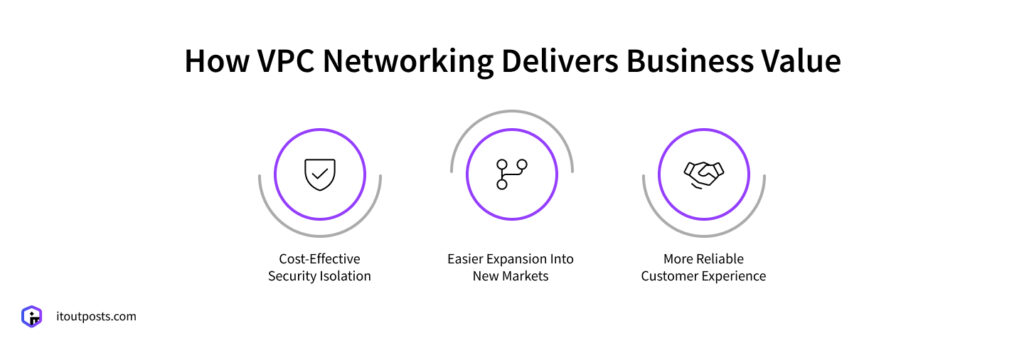Contents
Your business data is a precious asset. But what’s the best place to store it? You have two main choices: public clouds like AWS and Azure or private clouds you have complete control over. Public clouds are cost-effective, but your data shares space with others, which can raise security concerns. Private clouds, on the other hand, are way safer but, at the same time, much more expensive when it comes to setup and ongoing maintenance.
A virtual private cloud (VPC) is your third option, and it exists exactly to solve the security vs. scalability dilemma. It gives you the best of both worlds, as well as addresses many other issues. In this article, we explain how virtual private clouds work and share the main benefits they bring to businesses.
What Is a Public Cloud?
To better understand the power of VPC, let’s first overview its alternatives.
Public cloud platforms like AWS, Azure, and Google Cloud provide computing resources online through extensive data centers filled with servers and networking equipment. When you use public cloud services, you basically rent computing power, storage, and network capacity from these providers.
This model has significant advantages. You don’t have to spend your budget on equipment and its maintenance — your provider shoulders this burden. On top of that, the public cloud allows you to quickly adjust your resources up or down, depending on your traffic needs. Finally, public clouds come with many ready-to-use services related to databases, analytics, AI, and more.
Yet, the public cloud isn’t without its pitfalls, and the catch is exactly in its name — it’s public. Therefore, your cloud resources aren’t just yours; they’re shared with many other businesses. This means your data coexists with other companies’ data on the same hardware, and network traffic often travels through the same routes. Plus, performance may fluctuate when multiple users try to access resources simultaneously.
What Is a Private Cloud?
A private cloud is a computing infrastructure designed solely for one organization. Unlike public clouds, private clouds don’t share resources with other companies. In a private cloud, your company is the only one using the equipment — you either own it all or rent it just for yourself.
Private clouds allow companies to entirely control their infrastructure. Your team has the freedom to determine hardware configuration, security measures, and data storage locations.
However, the trade-off lies in cost and management complexity. Private clouds call for a big initial investment. You also need specialized personnel to maintain the hardware, apply security updates, etc. When additional capacity is needed, you have to buy and install more equipment yourself — this is the process that can be as tedious as it’s time-consuming.

Virtual Private Cloud Is the Middle Ground
A virtual private cloud provides an isolated section within the public cloud provider’s infrastructure. With VPC, you have your own dedicated network space inside AWS, Azure, or Google Cloud, completely cut off from other customers.
As we’ve mentioned, VPC strikes a great balance between public and private clouds. You benefit from the cost-effectiveness, rapid scaling, and advanced services of the public cloud, while enjoying boosted security and increased control — characteristics common to a private cloud.
In the end, your apps and data run on the same budget-friendly hardware as everyone else, but they’re kept as private as if they were in your very own data center.

How Do You Separate Your VPC from Others?
When you sign up with a cloud provider, you gain access to their VPC tools. They’re necessary for your DevOps team to design your private network section within the public cloud.
Here are the main ways the security walls are built in public clouds:
- Private IP address spaces. When your DevOps team sets up a VPC, they reserve certain address ranges that belong exclusively to your company. No other customer in the public cloud can see and use these addresses. This creates the first line of defense between your systems and the rest of the cloud’s space.
- Network access controls. Virtual firewalls manage all traffic to and from your VPC, blocking any unauthorized access attempts. These controls function around the clock, checking every network connection request. If you don’t specifically allow someone to connect, this traffic will be automatically denied. Thus, even if someone discovers your private addresses, they won’t be able to connect without permission.
- Subnet isolation. Next, your DevOps team should also set up sections, called subnets within your VPC. Each subnet has different security levels and access rights. Public subnets link to the internet and often support customer-facing services like websites. Private subnets have no direct internet access and usually host critical systems like databases or internal applications.
- Identity-based permissions. And even within your own organization, not everyone should be able to access all resources and information. Before users can enter any system, they must verify their identity using credentials like usernames, passwords, or digital security tokens. These measures help protect against both external threats and internal accidents when someone may unintentionally damage or expose sensitive data.
How VPC Networking Delivers Business Value
So, we’ve already established that VPC networking comes with advantages that neither traditional public nor private clouds can match alone. But what does it mean for business?

Cost-Effective Security Isolation
VPCs let you keep your data safe and sound without the need to invest in dedicated hardware. Unlike private clouds, you don’t have to invest in physical equipment, and compared to regular public clouds, you receive total separation from other users.
Easier Expansion Into New Markets
VPC networking makes it easier and more affordable to expand into new regions. You can launch services in a new country without opening offices there. Your applications will work in local data centers, which guarantees excellent performance for customers in those areas.
More Reliable Customer Experience
Traditional public clouds require your applications to share hardware with multiple users. During peak times, these “noisy neighbors” can consume resources, slowing down your services.
Private clouds address an isolation issue but still don’t completely solve the reliability problem. If traffic goes over what your hardware can handle, it will be impossible to add more resources right away. You’ll be experiencing slowdowns or even downtimes until you can procure and set up additional equipment.
But in VPC, your applications run in isolated environments that aren’t affected by other customers’ activities. When you need more capacity, you can instantly allocate additional resources within your private network boundary. This means your performance is always steady, no matter what other cloud users do.
Build Your Future-Proof Network in One Week
Businesses face increasing digital demands, and they can no longer choose between security and flexibility. VPCs let them have both.
At IT Outposts, we recognize that the cloud strategy isn’t just an IT decision — it’s a business decision that directly impacts your customer experience, competitive position, and the company’s bottom line.
Therefore, we set up VPCs with both security and scalability in mind. We make sure there’s plenty of room to grow by creating large subnets where more services can be added as you expand.
Once we build your VPC architecture, we’ll equip you with environment design documentation and setup scripts for automation. You’ll be able to decide where to place new services, whether they must be public-facing or private.
VPC networking configuration is part of our AMIX, a pre-built infrastructure designed based on 50+ successful DevOps projects. Discover AMIX and reach out to us to create a solid tech foundation for your business success!

I am an IT professional with over 10 years of experience. My career trajectory is closely tied to strategic business development, sales expansion, and the structuring of marketing strategies.
Throughout my journey, I have successfully executed and applied numerous strategic approaches that have driven business growth and fortified competitive positions. An integral part of my experience lies in effective business process management, which, in turn, facilitated the adept coordination of cross-functional teams and the attainment of remarkable outcomes.
I take pride in my contributions to the IT sector’s advancement and look forward to exchanging experiences and ideas with professionals who share my passion for innovation and success.